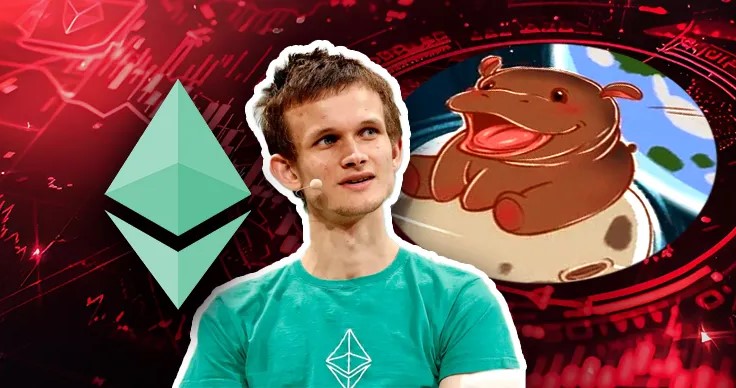Ethereum co-founder Vitalik Buterin has once again made headlines, selling 10 billion MOODENG tokens—a popular memecoin launched on the Solana blockchain—and donating a significant portion of the proceeds to his charitable fund, Kanro. Known for his focus on the greater good within the crypto community, Buterin’s latest move is a testament to his unwavering stance on utilizing cryptocurrency for social impact. But this sale, which immediately led to a sharp drop in MOODENG’s price, has generated a mix of reactions in the community.
Vitalik Buterin’s Sale Sparks Market Reaction
According to blockchain analytics firm Lookonchain, Buterin sold 10 billion MOODENG tokens for 308.7 ETH, valued at approximately $762,000. Out of this, he donated 260.15 ETH (around $640,000) to his biotech charity, Kanro. This significant gesture aligns with Buterin’s past efforts to channel memecoin proceeds into philanthropic causes.
The MOODENG token price responded rapidly to the sale, plummeting by 20% and leaving it trading around $0.10. The sudden price dip stirred anxiety among token holders, many of whom saw the drop as a negative sign for the token’s future. However, Buterin has reiterated his policy of donating tokens he receives, encouraging developers and communities to prioritize direct contributions to charitable causes instead.
Buterin Advocates for Charitable Use of Memecoins
Following the sale, Buterin took to Twitter to clarify his stance on memecoins and charitable contributions. In his statement, he emphasized that all memecoins sent to his wallet will ultimately end up supporting charitable initiatives, urging creators to consider forming Decentralized Autonomous Organizations (DAOs) to enable community-driven philanthropy.
“Anything that gets sent to me gets donated to charity, though I truly prefer if you guys send to charity directly,” Buterin wrote in his tweet.
His message was clear: memecoins have the potential to generate real-world impact when channeled correctly. As one of the leading voices in the crypto space, Buterin has long advocated for integrating philanthropy into blockchain projects, promoting the use of cryptocurrency beyond speculation and short-term gains.
The Role of Kanro in Advancing Global Health Solutions
Buterin’s biotech charity, Kanro, is dedicated to solving some of the world’s most pressing health challenges. It primarily focuses on pandemic solutions and anti-airborne disease technology, particularly in low-income regions that are often neglected by mainstream initiatives. This recent donation will further bolster Kanro’s efforts in developing innovative approaches to disease prevention.
By directing his contributions toward cutting-edge health solutions, Buterin hopes to showcase the positive impact that can arise from the decentralized nature of cryptocurrencies.
Implications for MOODENG and Other Memecoins
Buterin’s action has cast a spotlight on MOODENG, a relatively new memecoin on Solana that saw a surge in popularity due to its humorous branding and rapidly growing community. The token’s 20% decline post-sale has raised concerns about its long-term viability, especially as Buterin’s public stance on memecoins generally discourages speculative trading.
The incident also highlights a broader issue within the crypto world: the volatility that occurs when prominent figures like Buterin decide to liquidate holdings. Many memecoins sent to Buterin’s wallet are unsolicited donations, and his decision to sell them may signal to communities that more robust mechanisms are needed to ensure price stability in the future.
Vitalik’s Vision for Crypto-Driven Philanthropy
Buterin’s continued involvement in charitable activities from token proceeds showcases his unique approach to blockchain’s potential for good. While some see memecoins as trivial or purely speculative, Buterin’s insistence on using such assets for charity sets a powerful example of how decentralized technologies can be a force for positive change.
The Ethereum co-founder’s call to action—encouraging communities to set up DAOs for charitable decision-making—highlights the role of community governance in modern philanthropy. DAOs, which rely on decentralized decision-making processes, could serve as a template for transparent and democratic charitable contributions, removing some of the ambiguity that typically accompanies traditional donations.
What’s Next for MOODENG and the Community?
The aftermath of Buterin’s sale raises questions about the future trajectory of MOODENG. While the price drop is concerning for many, the project’s community may take this opportunity to reflect on its goals and consider Buterin’s challenge to focus more on value creation through philanthropy. Whether through direct contributions to causes or by forming a DAO, the MOODENG community could emerge stronger and more purpose-driven in response.
For now, the incident serves as a reminder that memecoins can be more than just a speculative frenzy—they can also act as catalysts for social good, provided the community aligns on a shared vision.
Final thoughts
Vitalik Buterin’s recent sale and subsequent donation of 10 billion MOODENG tokens underscores his commitment to leveraging cryptocurrency for meaningful change. By channeling proceeds into Kanro’s groundbreaking health initiatives, he is demonstrating that even memecoins, often dismissed as mere jokes, can contribute to the larger societal good.
As the crypto community navigates the implications of Buterin’s latest move, one thing remains clear: the power of digital assets lies not just in their financial value but in their ability to transform lives and advance humanitarian causes.
QUEEN WHALE
Views: 8




